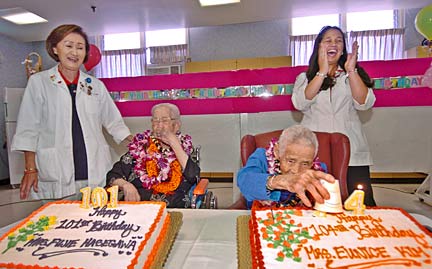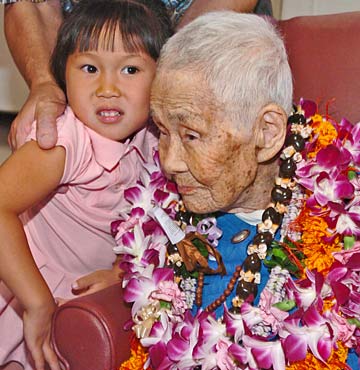CENTENARIANS

Leahi Hospital held a program honoring its oldest patients yesterday in conjunction with National Nursing Home Week. The two oldest residents are Fujie Hasegawa, 101 this month, left, and Eunice Kim, 104. Between them is Dorothy Watanabe, Hasegawa's 71-year-old daughter.
Difficult years
fail to dampen spirits
Family, friends and hospital
staff recognize two matriarchs
whose long lives inspire awe
Centenarians Eunice Kim and Fujie Hasegawa might have found the secret to long life: hard work and perseverance.
Mike Kim said his mother, Eunice, was "kind of a feisty person" growing up and as the youngest of three children was called "little twerp," a name that stuck.
Margaret Tanouye said her mother, Hasegawa, "worked hard to raise all of us. She was always one step ahead of us. That's what I think has kept her alive so long."
Family, friends and Leahi Hospital staff honored the women with leis and birthday cakes during a ceremony yesterday as part of National Nursing Home Week.
Kim, born in Cheong Ju, Korea, celebrated her 104th birthday April 23. Hasegawa, born in Hiroshima, Japan, will be 101 on May 22.
Thomas Driskill, president and chief executive of the Hawaii Health Systems Corp., noted the 2002 census listed 12 people on Oahu 100 and older.

Fujie Hasegawa, seated left, caught her breath after blowing out her birthday candles yesterday at Leahi Hospital. At right, Eunice Kim used a cup to snuff out the flames on her cake, winning smiles and applause from Leahi Hospital nurse managers Lana Ige and Franchele Martin. The program at Leahi honored the hospital's oldest patients in conjunction with National Nursing Home Week. Below, Kim posed with her great-granddaughter Christiana, 4.
Hasegawa blew out three candles on her cake while Kim saved her breath and snuffed out the candles with a paper cup.
Mike Kim's mother and father, Paul H., "went through a lot of hardships" in Korea during World War II and the Korean War, he said. "My family lost everything."
His mother had earned a nursing degree with high honors despite bias against higher education for rural students and made money as a nurse and licensed midwife, he said.
"She was a tough lady," he said. She started buying lands around Seoul before World War II, but during the war all produce from sharecroppers went to the government and she made no money, he said.
After the Korean government was established, it took over the lands and gave his mother a bond "which was worth nothing," he said.
His father had studied in Japan and at Oxford, England, and became an aide to the military government after the occupational army went to Korea, he said.
"Overnight, he became a powerful man in the province," but he would not take any bribes and made no money, Kim said. His mother opened a midwife clinic to support the family.
His father came to Hawaii in 1954 at the Episcopal bishop's invitation to be minister at St. Luke's Church, and his mother followed in 1956.

"She is in better shape healthwise than her children are." --Bob Hasegawa, son of centenarian Fujie Hasegawa
After six years, Kim said, they returned to Hawaii because they missed their grandchildren (he had three children) and settled in Waianae on a small farm.
His mother lived in a Korean care home in Liliha after his father died in 1992, then was admitted to Leahi Hospital in 1995, he said. "She is so happy here. When I come around, she says, 'Go, go, go home.'"
Fujie Hasegawa and her husband, James Shunzo Hasegawa, lived on Big Island, Maui, Lanai and Oahu plantations.
Her hobbies were cooking and sewing, and "she did both extremely well," said son Bob Hasegawa, former state labor director and former head of the University of Hawaii Center for Labor Education and Research.
His father was put into an internment camp from 1942 to 1945, and Fujie Hasegawa cared for their three sons and two daughters.
She said all the children dieted while their mother ate everything. "She is mentally healthy and never forgets anything," Tanouye said.
"She is in better shape healthwise than her children are," said Bob Hasegawa. His mother broke out in a big laugh when told he said that.
His brother, Teruo, takes an Okinawan sweet potato to their mother every morning.
Bob Hasegawa credited his mother's "good genes and excellent care" at Leahi Hospital for her well-being and her strength and optimism for the future and will to live.
His mother was severely beaten in a burglary of a care home in which she was living in 1995 and was in a coma for 74 hours. "The doctor gave up hope," Tanouye said.
"The whole family, brothers, sisters and kids, stood vigil over her, planning her funeral," Hasegawa said. To be celebrating her upcoming 101th birthday "is simply amazing," he said.
Like Kim, he praised Leahi's staff and services for "magnificent" treatment of his mother.
The hospital, at 3675 Kilauea Ave., has 179 long-term care beds, all filled, said Sally Ishikawa, director of nursing.
[News] [Business] [Features] [Sports] [Editorial] [Do It Electric!]
[Classified Ads] [Search] [Subscribe] [Info] [Letter to Editor]
[Feedback]
